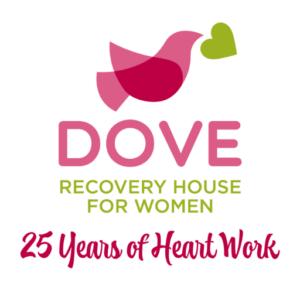One of the wrap-around support programs offered at Dove Recovery House for Women in Dubois County is Trauma-Informed Financial Literacy. Dove House’s mission centers on helping women become healthy, sober, and self-sufficient. While most substance use treatment programs focus on therapy and education, Dove House takes a holistic approach by including financial literacy as one of its wrap-around services.
What is Trauma-Informed Financial Literacy?
Trauma-Informed Financial Literacy is a shame-free approach to teaching women how to manage their finances. Many traditional financial literacy programs rely on shame as a deterrent, but shame has been proven ineffective in changing behavior. This class, taught by Kate Letterman Conway, a therapist at Dove House in Dubois County, instead encourages education, understanding, and empowerment.
Through Trauma Informed Financial Literacy, women learn practical skills like budgeting, negotiating pay, understanding credit, and investing. Beyond the basics, the program also addresses deeper topics such as emotional spending, values-based budgeting, and setting financial boundaries. The focus is not just on money but also on the emotional habits tied to financial decision making.
Kate draws inspiration from the book Financial Feminist, which explores the unique financial challenges women face from the gender pay gap to the pink tax—where products marketed to women are priced higher than equivalent products for men. These are not the only systemic barriers women face.
“Women are also more likely to serve as unpaid caregivers, pay for childcare, and put their careers on hold to support family,” said Kate. “These financial realities mean women must often navigate a much more challenging economic landscape than men do.”
Trauma-Informed Financial Literacy is about more than just money—it’s about empowerment, independence, and breaking generational cycles. For the women of Dove House, gaining control over their finances is a critical step toward long-term recovery and self-sufficiency.
“Financial literacy is women’s empowerment,” said Kate.
Emotions, Moods & Money Habits
For many women in recovery, shame plays a significant role in their relationship with money. Childhood experiences and generational patterns often shape their financial habits. This program invites participants to examine these influences through activities like mapping their “financial family tree” or exploring how attachment styles affect their approach to money.
Emotions frequently drive spending decisions. In one particular exercise, Kate encourages the women to track their spending for a week and reflect on the feelings behind each purchase. This helps uncover the root causes of emotional spending and enables women to make decisions aligned with their values.
The course also teaches boundaries, particularly when dealing with friends or family members who may still be using substances or struggling financially. Learning how to navigate these situations empowers women to protect their financial stability while maintaining healthy relationships.
A Path Toward Financial Freedom
“For women in recovery, financial empowerment is life-changing. Substance use can create significant financial burdens, and unresolved money issues are a common trigger for relapse,” said Kate. “By equipping women with the knowledge and tools to manage their finances, Dove House is addressing one of the root causes of instability for many clients.”
Through programs like Trauma Informed Financial Literacy, Dove House is filling an essential gap in recovery resources, giving women the skills and confidence to take charge of their futures. By replacing shame with education and empowerment, Kate is helping women rewrite their financial narratives and take meaningful steps toward lasting independence.



